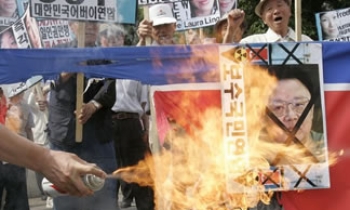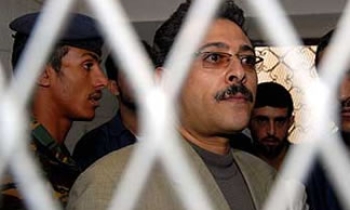(RSF/IFEX) - Another Tunisian journalist is on hunger strike. It is Shéhérazade Akacha, who began her hunger strike on 19 April 2006 in protest against her dismissal from the pro-government daily "Al-Chourouk" for revealing details of her interrogation and harassment by the newspaper's management after she refused to let others "dictate" an article she wrote for the 7 November 2005 supplement. A transcript of the interrogation was posted on the Tunisnews.Net website.
"I demand the right to be able to do my duty as a journalist freely and with dignity, and to be able to transmit objective information without outside intervention," she told Reporters Without Borders. "I would also like to put an end to the harassment of which I am a victim every day."
Akacha joins fellow "Al-Chourouk" journalist Slim Boukhdir, who had been on hunger strike for more than two weeks. He has already lost 11 kilos and has serious heart problems. He told Reporters Without Borders he was determined to press on to the end with his demands. "I no longer have any other way to express myself," he said. "All I want is my passport and my salary back as well as the right to circulate freely without being harassed by the police."
Voicing concern about the state of health of journalist Slim Boukhdir, who has been on hunger strike since 4 April, and imprisoned lawyer and cyber-dissident Mohammed Abbou, who began a hunger strike on 11 March, Reporters Without Borders has appealed to the Tunisian authorities to heed their demands.
"Four months have gone by since the World Summit on the Information Society in Tunis, but the harassment and threats against journalists and cyber-dissidents have not stopped," the press freedom organisation said. "The case of Boukhdir, who has had his passport confiscated and his pay frozen because of what he wrote, is a perfect example. It is unacceptable that journalists have to resort to hunger strikes when they are made to suffer for expressing themselves freely."
Reporters Without Borders added: "President Zine El Abidine Ben Ali pardoned more than 80 political prisoners on 25 February, but he has continued to turn a deaf ear to the demands from international human rights organisations and Tunisian civil society for the release of Abbou, who has been in prison for more than a year."
A reporter for the pro-government daily "Al-Chourouk" and Tunis correspondent for the pan-Arab satellite TV news station Al-Arabiya, Boukhdir allegedly criticised the Tunisian authorities in articles for the station's website, alarabiya.net. He posted statements by leaders of political parties that lack government recognition and by members of a group of government opponents who staged a joint hunger strike last October and November. He also commented on the situation of Tunisia's political prisoners, especially Abbou.
Boukhdir told Reporters Without Borders he has been ostracised by "Al-Chourouk", which has not published any of his articles since November. "My salary has been frozen since February, but they refuse to give me a formal dismissal notice," he said. "They are also refusing to give me a press card. So I am now demanding the right to free expression and the right to work."
Abbou is staging his hunger strike in protest against a deterioration of his prison conditions since 2 March, when his wife, Samia Abbou, and four of his lawyers staged a demonstration outside his prison in Kef, brandishing photos of him and chanting his name. The police had stopped their car about 15 times on the road from Tunis to Kef, while other human rights activists who tried to join the demonstration were forced to turn back.
Samia Abbou told Reporters Without Borders that her husband has lost a lot of weight and she is very worried about his state of health.
Known as the "freedom lawyer," Abbou has been detained since 1 March 2005. He received a total of three and a half years in prison terms at a sham trial on 29 April 2005. The sentences were upheld on appeal on 10 June 2005.
He was given two years for a supposed physical attack on a woman lawyer in 2002, although no evidence was presented for the attack. And he was given a year and a half for an article posted on a website that compared the torture of political prisoners in Tunisia to that perpetrated by US soldiers at Abu Ghraib prison in Iraq.









